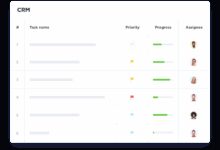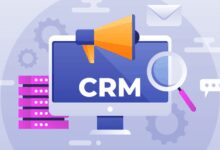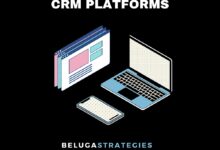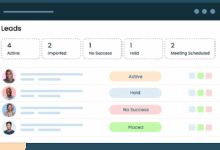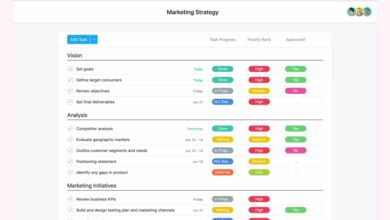The Best CRM Software for Small Business: 7 Ultimate Power Tools
Choosing the best CRM software for small business can feel overwhelming—but it doesn’t have to be. With the right tool, you can boost sales, strengthen customer relationships, and streamline daily operations—all without breaking the bank.
Why the Best CRM Software for Small Business Is a Game-Changer

Customer Relationship Management (CRM) software has evolved from a luxury for large enterprises into an essential tool for small businesses. In today’s competitive market, managing customer interactions efficiently is no longer optional—it’s a necessity. The best CRM software for small business empowers entrepreneurs to track leads, automate follow-ups, and gain valuable insights into customer behavior—all from a single platform.
Improving Customer Retention and Satisfaction
One of the most significant benefits of using the best CRM software for small business is improved customer retention. By centralizing customer data—such as purchase history, communication logs, and preferences—teams can deliver personalized experiences at scale. According to a study by Northwestern University, increasing customer retention rates by just 5% can increase profits by 25% to 95%.
- Centralized customer profiles enhance personalization
- Automated responses reduce response time
- Follow-up reminders ensure no lead falls through the cracks
“A CRM isn’t just a database—it’s a relationship engine.” — Salesforce Blog
Streamlining Sales and Marketing Efforts
The best CRM software for small business integrates seamlessly with email marketing, social media, and sales pipelines. This integration allows small teams to run targeted campaigns, track engagement, and convert leads faster. For example, tools like HubSpot and Zoho CRM offer built-in email tracking and campaign analytics, enabling businesses to refine their strategies in real time.
- Automated lead scoring prioritizes high-potential prospects
- Marketing automation reduces manual workload
- Sales forecasting tools help predict revenue trends
Key Features to Look for in the Best CRM Software for Small Business
Not all CRM platforms are created equal. When evaluating options, small business owners should focus on features that align with their operational needs, budget, and growth goals. The best CRM software for small business balances functionality with ease of use.
User-Friendly Interface and Quick Onboarding
A cluttered or overly complex interface can hinder adoption among team members. The best CRM software for small business offers an intuitive dashboard, drag-and-drop functionality, and minimal learning curves. Platforms like Insightly and Freshsales are known for their clean UI and guided setup processes that get users up and running in under an hour.
- Drag-and-drop pipeline customization
- Mobile app compatibility for remote access
- Interactive onboarding tutorials
Integration Capabilities with Existing Tools
Your CRM should work seamlessly with tools you already use—like Gmail, Outlook, Slack, Shopify, or QuickBooks. The best CRM software for small business supports API access and native integrations with popular platforms. For instance, Zapier connects over 5,000 apps to CRM systems, enabling automation across workflows without coding.
- Native integration with email and calendar apps
- Support for e-commerce platforms like WooCommerce
- Two-way sync with accounting software
Top 7 CRM Platforms: The Best CRM Software for Small Business in 2024
After extensive research and user feedback analysis, we’ve compiled a list of the seven most effective CRM solutions tailored for small businesses. Each platform offers unique strengths, pricing models, and scalability options.
1. HubSpot CRM – Best Overall for Free Functionality
HubSpot CRM stands out as the best CRM software for small business due to its powerful free tier, extensive integrations, and user-friendly design. It offers contact management, deal tracking, email scheduling, and live chat—all at no cost. Paid upgrades unlock advanced features like automation, custom reporting, and marketing tools.
- Free forever plan with robust features
- Seamless integration with Gmail and Outlook
- AI-powered sales suggestions and meeting scheduling
According to G2 reviews, HubSpot CRM has a 4.4/5 rating based on over 15,000 user reviews, making it one of the most trusted platforms in the market.
2. Zoho CRM – Best for Customization and AI
Zoho CRM is ideal for small businesses that need flexibility and intelligent automation. Its AI assistant, Zia, predicts deal closures, detects sentiment in emails, and recommends next steps. Zoho also allows deep customization of workflows, fields, and dashboards—perfect for niche industries.
- AI-driven insights and automation
- Custom modules for unique business processes
- Multi-channel communication (email, phone, social)
Zoho CRM integrates with over 40 Zoho applications and third-party tools like Mailchimp and QuickBooks. Its pricing starts at $14/user/month, making it highly affordable for growing teams.
3. Salesforce Essentials – Best for Scalability
Salesforce, a leader in the CRM space, offers Salesforce Essentials—a version tailored specifically for small businesses with up to 10 users. It provides a simplified interface while retaining the power of the full Salesforce ecosystem. As your business grows, migrating to higher-tier Salesforce plans is seamless.
- Cloud-based with real-time data access
- Pre-built sales and service workflows
- Strong mobile app for field teams
Salesforce Essentials starts at $25/user/month and includes customer support, lead management, and activity tracking. More details can be found on the official Salesforce pricing page.
4. Freshsales (by Freshworks) – Best for Sales Automation
Freshsales excels in automating repetitive sales tasks. It includes built-in phone, email, and chat capabilities, along with AI-based lead scoring and visual deal timelines. Its smart contact merging and activity capture features reduce manual data entry.
- Integrated phone and email within the CRM
- AI-powered lead prioritization
- Visual sales pipeline with drag-and-drop functionality
Freshsales offers a free plan for up to three users and paid plans starting at $15/user/month. It’s particularly popular among startups and tech-focused small businesses.
the best crm software for small business – The best crm software for small business menjadi aspek penting yang dibahas di sini.
5. Pipedrive – Best for Visual Sales Pipeline Management
Pipedrive was built by salespeople for salespeople. Its core strength lies in its visual sales pipeline, which makes it easy to track deals across stages. The interface is minimalistic yet powerful, focusing on moving leads through the funnel efficiently.
- Drag-and-drop deal management
- Activity reminders and to-do lists
- Revenue forecasting and custom reports
Pipedrive integrates with over 400 tools via Zapier and native apps. Pricing starts at $14.90/user/month, and a 14-day free trial is available. Learn more at pipedrive.com.
6. Insightly – Best for Project and CRM Integration
Insightly combines CRM with project management, making it ideal for service-based small businesses like consultants, contractors, and agencies. It allows users to link contacts to projects, track tasks, and manage deadlines—all within one system.
- Project and task management inside CRM
- Relationship linking to map customer networks
- Bidirectional sync with Google Workspace
Insightly starts at $29/user/month and offers a 14-day free trial. It’s especially useful for businesses managing long-term client engagements.
7. Keap (formerly Infusionsoft) – Best for Marketing Automation
Keap is designed for small businesses that want to automate marketing and sales processes together. It offers powerful email automation, appointment scheduling, and payment collection features. While it has a steeper learning curve, its ROI for service-based businesses (like coaches, consultants, and fitness trainers) is significant.
- Advanced email campaign automation
- Appointment booking with calendar sync
- Integrated payment processing
Keap’s pricing starts at $99/month for the Lite plan and goes up to $299/month for Max. A free demo is available on keap.com.
How to Choose the Best CRM Software for Small Business
Selecting the right CRM isn’t just about features—it’s about fit. The best CRM software for small business should align with your team size, industry, budget, and long-term goals. Here’s a step-by-step guide to help you make the right decision.
Assess Your Business Needs and Goals
Start by identifying your pain points. Are you losing leads due to poor follow-up? Struggling to track customer interactions? Need better reporting? Define your primary objectives—whether it’s improving sales conversion, enhancing customer service, or automating marketing.
- List your top 3 business challenges
- Determine which departments will use the CRM
- Set measurable goals (e.g., increase lead conversion by 20%)
Evaluate Budget and Pricing Models
Most CRM platforms charge per user per month. While free options like HubSpot CRM are great for startups, growing teams may need paid plans. Consider not only the sticker price but also hidden costs like training, integration, and add-ons.
- Compare annual vs. monthly billing discounts
- Check for setup or migration fees
- Look for nonprofit or startup discounts
Test with Free Trials and Demos
Never commit without testing. The best CRM software for small business should feel intuitive to your team. Take advantage of free trials (most offer 14–30 days) and request live demos. Involve key team members in the evaluation process to ensure buy-in.
- Import sample data to test functionality
- Simulate daily workflows (e.g., logging calls, sending emails)
- Gather feedback from sales, marketing, and support teams
Common Mistakes to Avoid When Implementing CRM
Even the best CRM software for small business can fail if implemented poorly. Many small businesses make avoidable errors that lead to low adoption, data inaccuracies, or wasted investment.
Skipping Employee Training
One of the top reasons CRM projects fail is lack of proper training. Employees may resist using a new system if they don’t understand its value or how to navigate it. Invest time in onboarding sessions, create internal guides, and assign a CRM champion to support the team.
- Schedule regular training workshops
- Create video tutorials for common tasks
- Encourage feedback to improve usage
Poor Data Management and Entry
A CRM is only as good as the data it contains. Inconsistent or incomplete data leads to inaccurate reports and missed opportunities. Establish data entry standards and use automation to minimize manual input.
- Standardize contact naming and tagging
- Use form validation and dropdowns
- Regularly clean duplicate or outdated records
“Garbage in, garbage out. Your CRM is only as smart as the data you feed it.” — TechRadar
Over-Customizing Too Early
While customization is powerful, overdoing it early can complicate the system and slow down adoption. Start with default settings, let your team get comfortable, and then gradually introduce custom fields, workflows, and automations.
- Begin with essential fields only
- Use pre-built templates when possible
- Review customization needs quarterly
Future Trends in CRM for Small Businesses
The best CRM software for small business isn’t static—it evolves with technology. Staying ahead of trends ensures your business remains competitive and customer-centric.
AI and Predictive Analytics
Artificial intelligence is transforming CRM by predicting customer behavior, automating responses, and suggesting optimal follow-up times. Platforms like Zoho CRM and Salesforce are already embedding AI into their core features, offering small businesses enterprise-level intelligence at affordable prices.
the best crm software for small business – The best crm software for small business menjadi aspek penting yang dibahas di sini.
- Predictive lead scoring
- Sentiment analysis in customer emails
- AI-generated email drafts
Mobile-First and Remote Access
With the rise of remote work, mobile CRM access is no longer optional. The best CRM software for small business offers robust mobile apps that allow teams to update records, make calls, and view pipelines from anywhere.
- Offline access and sync capabilities
- Mobile-specific dashboards
- GPS-based visit tracking for field sales
Integration with Communication Platforms
CRMs are increasingly integrating with tools like WhatsApp, Slack, and Microsoft Teams. This allows businesses to manage customer conversations across channels without switching apps. For example, HubSpot now supports WhatsApp integration for direct messaging.
- Unified inbox for emails, calls, and chats
- Real-time collaboration within the CRM
- Automated logging of external communications
Real-World Success Stories: How Small Businesses Benefit from CRM
The best CRM software for small business isn’t just about features—it’s about results. Let’s look at real examples of small businesses that transformed their operations using CRM tools.
Case Study: Local Marketing Agency Boosts Client Retention by 40%
A boutique digital marketing agency in Austin, Texas, struggled with tracking client communications across emails and calls. After implementing Zoho CRM, they centralized all interactions, set automated follow-ups, and used reporting to identify at-risk clients. Within six months, client retention improved by 40%, and upsell revenue increased by 25%.
- Used Zia AI to flag unhappy clients
- Automated monthly performance reports
- Linked projects to client records for better visibility
Case Study: E-commerce Store Increases Sales Conversion by 30%
An online fashion retailer with 10 employees used spreadsheets to manage orders and customer inquiries. They switched to HubSpot CRM, integrated it with Shopify, and set up automated email sequences for abandoned carts. As a result, their sales conversion rate jumped by 30% in three months, and customer service response time dropped from 12 hours to under 2.
- Tracked customer lifecycle from first visit to repeat purchase
- Segmented audiences for targeted campaigns
- Used deal stages to monitor post-purchase engagement
Conclusion: Finding Your Perfect CRM Match
The best CRM software for small business is not a one-size-fits-all solution. It’s a strategic tool that should grow with your company, adapt to your workflows, and enhance customer relationships. Whether you choose HubSpot for its free power, Zoho for AI-driven insights, or Keap for marketing automation, the key is to start, test, and optimize. With the right CRM, even a small team can operate like a well-oiled machine—driving sales, delighting customers, and scaling efficiently.
What is the best CRM software for small business with a free plan?
HubSpot CRM offers the most robust free plan, including contact management, email tracking, deal pipeline, and live chat. It’s ideal for startups and small teams looking to get started without upfront costs.
Can I use CRM software on my phone?
Yes, most modern CRM platforms like Salesforce, Zoho, and Pipedrive offer mobile apps for iOS and Android, allowing you to manage contacts, log calls, and update deals on the go.
How much does CRM software cost for small businesses?
Prices vary widely. Free options like HubSpot CRM exist, while paid plans typically range from $12 to $50 per user per month. Advanced platforms like Keap or Salesforce may cost more but offer deeper automation and scalability.
Do I need technical skills to use CRM software?
No, most CRM platforms are designed for non-technical users. They feature drag-and-drop interfaces, guided setup, and customer support. Basic computer literacy is sufficient to get started.
How long does it take to implement a CRM system?
With simple CRMs like HubSpot or Freshsales, you can be up and running in a day. More complex systems may take 1–4 weeks, including data migration, training, and customization.
the best crm software for small business – The best crm software for small business menjadi aspek penting yang dibahas di sini.
Recommended for you 👇
Further Reading:
